-
12-04-2023
Simulation training of caregivers at hospital discharge of patients with chronic diseases: an integrative review
Revista Brasileira de Enfermagem. 2023;76(6):e20230043
Abstract
Simulation training of caregivers at hospital discharge of patients with chronic diseases: an integrative review
Revista Brasileira de Enfermagem. 2023;76(6):e20230043
DOI 10.1590/0034-7167-2023-0043
Views0See moreABSTRACT
Objective:
to identify evidence about the use and effects of clinical simulation for preparing caregivers for discharging patients with chronic conditions.
Methods:
an integrative peer review in the Scopus, PubMed, Web of Science, Cumulative Index to Nursing and Allied Health Literature, ScienceDirect and Virtual Health Library databases, from July to September 2022.
Results:
3,218 studies were identified, with a final sample consisting of four national and two international articles. Using simulation as an educational technology contributed to caregiver preparation in home care. In most studies, using clinical simulation included using other strategies to complement training: expository dialogued class, conversation circle and audiovisual resources.
Final considerations:
simulation proved to be efficient for training caregivers, with the active participation of family members and nurses in health education actions.
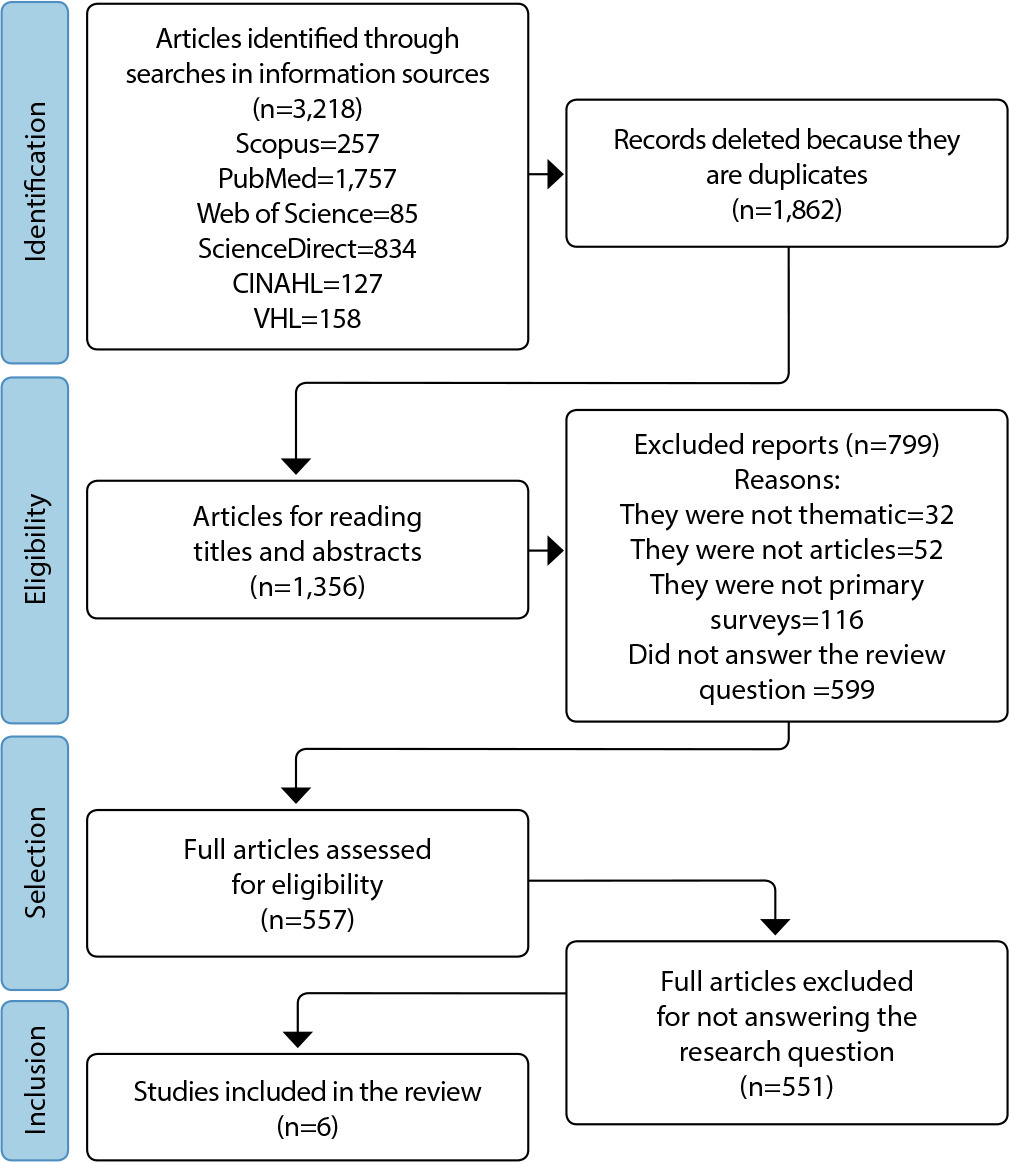
-
ORIGINAL ARTICLE12-04-2023
A longitudinal study of burden among spouse and non-spouse caregivers of older adults with stroke-induced-dependency
Revista Brasileira de Enfermagem. 2023;76(6):e20230052
Abstract
ORIGINAL ARTICLEA longitudinal study of burden among spouse and non-spouse caregivers of older adults with stroke-induced-dependency
Revista Brasileira de Enfermagem. 2023;76(6):e20230052
DOI 10.1590/0034-7167-2023-0052
Views0See moreABSTRACT
Objective:
to assess the burden of spouse and non-spouse caregivers of older adults with stroke-induced-dependency after discharge from a university hospital’s Specialized Care Stroke Unit in southern Brazil.
Methods:
a longitudinal survey. The sample consisted of 48 consenting caregivers, among which 20 were spouse caregivers. Data were collected between May 2016 and July 2018. One week after discharge, caregivers completed a sociodemographic profile, the Functional Independence Measure, and the Caregiver Burden Scale. Burden was also measured two months after discharge. Data were analyzed using Multivariate Analyses of Variance.
Results:
regarding time 1, non-spouse caregivers experienced greater burden with respect to social isolation (p = .01). Along with a persistently greater sense of isolation (p=.04), non-spouse caregivers felt far greater general strain (p =.01).
Conclusion:
statistically significant differences in burden over time highlight the importance of assessing caregiver burden after discharge and the need for a formal support program.
-
ERRATUM12-04-2023
ERRATUM
Revista Brasileira de Enfermagem. 2023;76(6):e2023n6e06
Abstract
ERRATUMERRATUM
Revista Brasileira de Enfermagem. 2023;76(6):e2023n6e06
DOI 10.1590/0034-7167.20237606e06
Views0In the article “Undergraduate nursing students’ knowledge and experience in infusion therapy and peripheral vascular acces”, with DOI number: , published in Revista Brasileira de Enfermagem, 2023;76(3): e20220219, authored:Where it read:[…]See more -
12-04-2023
Sobrecarga entre cuidadores cônjuges e não cônjuges de idosos dependentes por AVC: estudo longitudinal
Revista Brasileira de Enfermagem. 2023;76(6):e20230052
Abstract
Sobrecarga entre cuidadores cônjuges e não cônjuges de idosos dependentes por AVC: estudo longitudinal
Revista Brasileira de Enfermagem. 2023;76(6):e20230052
DOI 10.1590/0034-7167-2023-0052
Views0See moreRESUMEN
Objetivo:
evaluar la carga de los cuidadores conyugales y no conyugales de ancianos con dependencia inducida por ictus después del alta de la Unidad de Atención Especializada en Ictus de un hospital del sur de Brasil.
Métodos:
una encuesta longitudinal, con 48 cuidadores (20 cónyuges). Datos fueron recolectados entre mayo/2016 y julio/2018. Una semana después del alta, se aplicó la Medida de Independencia Funcional a los ancianos y la Caregiver Burden Scale a los cuidadores. Los datos se analizaron mediante análisis multivariado de varianza.
Resultados:
en tiempo 1, los cónyuges experimentaron mayor carga en relación al aislamiento social (p=0,01). Los cónyuges sintieron una tensión general y sensación de aislamiento mucho mayor (p=0,01; p=0,04).
Conclusión:
las diferencias estadísticamente significativas en la carga a lo largo del tiempo resaltan la importancia de evaluar la carga del cuidador después del alta y la necesidad de un programa de apoyo formal.
-
12-04-2023
Enfermagem e os Objetivos de Desenvolvimento Sustentável (ODS): Um Compromisso Essencial
Revista Brasileira de Enfermagem. 2023;76(6):e760601
Abstract
Enfermagem e os Objetivos de Desenvolvimento Sustentável (ODS): Um Compromisso Essencial
Revista Brasileira de Enfermagem. 2023;76(6):e760601
DOI 10.1590/0034-7167.2023760601pt
Views0Os Objetivos de Desenvolvimento Sustentável (ODS) são uma iniciativa global lançada pela Organização das Nações Unidas (ONU) em setembro de 2015 como parte da Agenda 2030 para o Desenvolvimento Sustentável, cujos objetivos sumarizam um apelo universal à ação para acabar com a pobreza, proteger o meio ambiente e garantir que todas as pessoas tenham acesso […]See more -
12-04-2023
Efeitos da auriculoterapia na ansiedade e biomarcadores na Atenção Primária à Saúde: um ensaio clínico
Revista Brasileira de Enfermagem. 2023;76(6):e20220728
Abstract
Efeitos da auriculoterapia na ansiedade e biomarcadores na Atenção Primária à Saúde: um ensaio clínico
Revista Brasileira de Enfermagem. 2023;76(6):e20220728
DOI 10.1590/0034-7167-2022-0728pt
Views0See moreRESUMEN
Objetivo:
evaluar los efectos de la auriculoterapia sobre la ansiedad y los niveles séricos de factor neurotrófico derivado de cerebro (BDNF), enolasa-específica de neurona (NSE) y proteína fijadora de calcio S100B (S100B) en adultos atendidos en Atención Primaria de Salud.
Métodos:
ensayo clínico piloto preexperimental. Se obtuvo información de 19 pacientes mediante el Inventario de Ansiedad Estado-Rasgo (STAI) y análisis de niveles séricos de BDNF, NSE y S100B.
Resultados:
la puntuación de ansiedad preintervención en el IDATE-Rasgo fue de 52,11±6,691 (CV 12,84%) y la valoración tras la auriculoterapia fue significativamente menor (43,72±8,141; CV 18,62%; P=0,0007). Los niveles de S100B se redujeron significativamente después de la auriculoterapia (de 64,03±72,18 a 54,03±68,53 pg/mL; CV 126,8%; P=0,0023).
Conclusión:
la auriculoterapia redujo efectivamente los niveles de ansiedad. Demostró ser seguro y fácil de aplicar, lo que permitió a las enfermeras realizar esta técnica de forma autónoma. También se evidenció una reducción de S100B, lo que demuestra una posible prevención del daño neuronal.
-
12-04-2023
Nursing and the Sustainable Development Goals (SDGs): An Essential Commitment
Revista Brasileira de Enfermagem. 2023;76(6):e760601
Abstract
Nursing and the Sustainable Development Goals (SDGs): An Essential Commitment
Revista Brasileira de Enfermagem. 2023;76(6):e760601
DOI 10.1590/0034-7167.2023760601
Views0The Sustainable Development Goals (SDGs) are a global initiative launched by the United Nations (UN) in September 2015 as part of the 2030 Agenda for Sustainable Development, whose objectives summarize a universal call to action to end poverty, protect the environment and ensure that all people have access to opportunities and well-being, all in an […]See more -
ORIGINAL ARTICLE12-04-2023
Effect of cardiovascular biofeedback on nursing staff stress: a randomized controlled clinical trial
Revista Brasileira de Enfermagem. 2023;76(6):e20230069
Abstract
ORIGINAL ARTICLEEffect of cardiovascular biofeedback on nursing staff stress: a randomized controlled clinical trial
Revista Brasileira de Enfermagem. 2023;76(6):e20230069
DOI 10.1590/0034-7167-2023-0069
Views0See moreABSTRACT
Objective:
to assess the effect of cardiovascular biofeedback on nursing staff stress when compared to an activity without self-monitoring.
Method:
a randomized controlled clinical trial, carried out with nursing professionals from a university hospital. The intervention group (n=58) performed cardiovascular biofeedback, and the control (n=57) performed an online puzzle without self-monitoring, totaling nine meetings over three weeks. The outcome was assessed using the Stress Symptoms and Work-Related Stress scales, and the biological marker heart rate variability. The generalized estimating equations method was used.
Results:
the intervention had no effect on self-reported instruments (p>0.050). However, there was an effect of time (p<0.050) on all heart rate variability indicators, demonstrating changes over the sessions.
Conclusion:
cardiovascular biofeedback showed promising results in the biological marker, suggesting that it can be used in nursing staff as a complementary therapy by promoting better autonomic nervous system regulation.

-
REVIEW01-01-2018
Coping strategies for domestic violence against pregnant female adolescents: integrative review
Revista Brasileira de Enfermagem. 2018;71:693-699
Abstract
REVIEWCoping strategies for domestic violence against pregnant female adolescents: integrative review
Revista Brasileira de Enfermagem. 2018;71:693-699
DOI 10.1590/0034-7167-2017-0682
Views0See moreABSTRACT
Objective:
To investigate and analyze in the scientific literature coping strategies for domestic violence against pregnant female adolescents.
Method:
This is an integrative literature review, conducted from July to August 2017 on LILACS, SciELO and PubMed, using the descriptors and the MeSH terms: confrontation, violence, adolescent, pregnant women, prenatal care.
Result:
The sample comprised 9 articles that were organized and characterized according to year, country of study and coping strategy used. The main forms of coping involved the active search for cases and the primary care approach with all family members.
Conclusion:
Individualized prenatal care, the change in professional training and networking activities were pointed out as important components of the strategies for coping with violence against pregnant adolescents.

-
RESEARCH01-01-2018
Repercussions of hospitalization due to fall of the elderly: health care and prevention
Revista Brasileira de Enfermagem. 2018;71:763-769
Abstract
RESEARCHRepercussions of hospitalization due to fall of the elderly: health care and prevention
Revista Brasileira de Enfermagem. 2018;71:763-769
DOI 10.1590/0034-7167-2017-0069
Views0See moreABSTRACT
Objective:
To know the repercussions of the fall reported by the elderly and their caregiver during hospitalization in a public hospital in Florianópolis city from October to December 2014.
Method:
Exploratory research with a qualitative approach, conducted by depth interviews with 16 participants, the eight elderly were hospitalized for falls and eight elderly caregivers. Data analysis were performed through the Thematic Content Analysis.
Results:
It was evidenced the thematic axis: Faller Elderly supported by four thematic categories: Changes caused by Falls, I am a faller, I take care of me and Prevention of the Fall. The repercussions of the fall were evidenced in the impairment of the health condition, self-care and functional capacity. We observed the naturalization of the phenomenon and the passivity with the harmful consequences of the event.
Final Considerations:
The fall is valued the more negative its repercussion, such as the need for hospitalization and surgery. Managing the vulnerability of the elderly, especially in primary care, evaluating their comorbidities and their internal and external environment, will minimize unfavorable consequences and the social and financial cost of hospitalizations.
-
RESEARCH01-01-2018
The adolescent and the institutionalization: understanding the phenomenon and meanings attributed to it
Revista Brasileira de Enfermagem. 2018;71:1373-1380
Abstract
RESEARCHThe adolescent and the institutionalization: understanding the phenomenon and meanings attributed to it
Revista Brasileira de Enfermagem. 2018;71:1373-1380
DOI 10.1590/0034-7167-2017-0242
Views1See moreABSTRACT
Objective:
To understand the meaning of being institutionalized and in conflict with the law for the institutionalized adolescent.
Method:
A qualitative, phenomenological-comprehensive study carried out in a Socio-educational Service Foundation in the northern region of Brazil, with 05 institutionalized adolescents. The analysis was carried out under the understanding of the content suggested by Heidgger, thus allowing the construction of analytical categories for a hermeneutical interpretation.
Results:
Conflicting with the law means something negative and bad for the institutionalized adolescents, in which they understand that although there is deprivation of liberty, the period of hospitalization is an important moment for the reflection on the need to start over.
Conclusion:
The meaning of conflicting with the law goes far beyond a simple word, act or behaviour, it is something that only those who experience the phenomenon are able to unveil, arouse deep feelings and provide reflection to the adolescent about the damages caused by the infraction.
-
RESEARCH01-01-2018
Identification of post-cesarean surgical site infection: nursing consultation
Revista Brasileira de Enfermagem. 2018;71:1395-1403
Abstract
RESEARCHIdentification of post-cesarean surgical site infection: nursing consultation
Revista Brasileira de Enfermagem. 2018;71:1395-1403
DOI 10.1590/0034-7167-2017-0325
Views0See moreABSTRACT
Objective:
To describe the profile of women in relation to their living conditions, health status and socio-demographic profile, correlating it with the presence of signs and symptoms suggestive of post-cesarean surgical site infection, identifying information to be considered in the puerperium consultation performed by nurses and proposing a roadmap for the systematization of care.
Method:
Quantitative, exploratory, descriptive, cross-sectional and retrospective review of medical records of women who had cesarean deliveries in 2014, in the city of São Paulo.
Results:
89 medical records were analyzed, 62 of them with incomplete information. In 11, there was at least one of the signs and symptoms suggestive of infection.
Conclusion:
Given the results of the study, the systematization of puerperal consultation is essential. The roadmap is an instrument that can potentially improve the quality of service and the recording of information.
-
RESEARCH01-01-2018
Nursing laboratory and critical education of nurses: approaches and distances
Revista Brasileira de Enfermagem. 2018;71:1500-1506
Abstract
RESEARCHNursing laboratory and critical education of nurses: approaches and distances
Revista Brasileira de Enfermagem. 2018;71:1500-1506
DOI 10.1590/0034-7167-2017-0339
Views1See moreABSTRACT
Objective:
to analyze the contribution of the laboratory of nursing to the critical education of nurses.
Method:
qualitative study, conducted among 18 professors of higher education institutions, being one public and the other private. Data were collected between February and November of 2016 by means of semi-structured interview. To analyze data, it was used a content analysis in the thematic modality.
Results:
it was observed the emphasis in the technical skills development by propagation of behavior and practices; the creation of bonds between professors and students happens on the limit of good interpersonal relationship; the laboratory of nursing may help the critical reflection about the practice, being a place that allows the learning of ethics.
Final considerations:
the nurse education, carried out by the laboratory of nursing, have to overcome the emphasis in the uncritical reproduction of practices and to observe the nurse’s power to think about the reality in the meaning of its modification.
-
RESEARCH01-01-2018
Introduction of the School Health Program in the city of Cascavel, Paraná State: report of nurses
Revista Brasileira de Enfermagem. 2018;71:1540-1547
Abstract
RESEARCHIntroduction of the School Health Program in the city of Cascavel, Paraná State: report of nurses
Revista Brasileira de Enfermagem. 2018;71:1540-1547
DOI 10.1590/0034-7167-2017-0188
Views1See moreABSTRACT
Objective:
to understand the introduction of the School Health Program in the city of Cascavel, Paraná State, as opposed to the report of nurses.
Method:
a qualitative study with fifteen participants. The data were collected from April to August 2015, through semi-structured interviews, analyzed by content analysis and thematic modality.
Results:
the category “Introduction process” of the School Health Program integrates the subcategories “Identified health problems” and the “Challenges of intersectoriality”. The program was implemented quickly, with a fragile training of professionals to perform in the phases that compose it. Structural conditions of schools, human and material resources, and emerging intersectoral interaction were identified obstacles. The integration of the health, school, and family constitutes the program’s potentiality.
Final considerations:
it is understood that the actions of the program were based on health assessments of students, and it is necessary for professionals and managers to discuss and analyze the obstacles identified to achieve all the proposed objectives.
-
RESEARCH01-01-2018
Knowledge about precautions in Primary Health Care: tool validation
Revista Brasileira de Enfermagem. 2018;71:1589-1595
Abstract
RESEARCHKnowledge about precautions in Primary Health Care: tool validation
Revista Brasileira de Enfermagem. 2018;71:1589-1595
DOI 10.1590/0034-7167-2017-0886
Views0See moreABSTRACT
Objective:
To elaborate and validate a tool to assess knowledge and behavior of nursing professionals about standards and specific precautions in the Primary Health Care.
Method:
Methodological study of the elaboration and validation of the tool by thirteen experts judges, using a Likert scale of 4 points, with Content Validity Index ≥ 0.80, on clarity, relevance and pertinence.
Results:
A tool composed of 47 dichotomous questions to assess knowledge and 12 questions, with five options of answers, for the referred behavior. In the validation, only one item was deleted, related to the “Hands Hygiene” axis and one item was reformulated, regarding “Use of Common Gloves” and another 11 changed writing. The tool as a whole was assessed for relevance, comprehensiveness and representativeness within the scope of the topic investigated.
Conclusion:
The developed tool has been validated and is now available for use in Primary Health Care.
-
RESEARCH01-01-2018
Training in diabetes education: meanings attributed by primary care nurses
Revista Brasileira de Enfermagem. 2018;71:1611-1618
Abstract
RESEARCHTraining in diabetes education: meanings attributed by primary care nurses
Revista Brasileira de Enfermagem. 2018;71:1611-1618
DOI 10.1590/0034-7167-2017-0792
Views1See moreABSTRACT
Objective:
seize meanings attributed by primary care nurses to training in diabetes education.
Method:
exploratory and descriptive study, with a qualitative approach, with twenty primary care nurses; semistructured interview script, with interviews processed in the IRaMuTeQ software and analyzed through the Descending Hierarchical Classification. The results were subsidized in the Representational Theory of Meaning.
Results:
nurse training in diabetes education is insufficient for holistic action, although it allows the community to be instrumentalized in specific issues about the disease, using the limited tools available, especially lectures. Nurses find themselves in a context of challenges, improvisations, weaknesses, and limitations that determine the meaning attributed to diabetes education and subsequent actions.
Conclusion:
the meanings attributed by the nurses revealed an incipient training, which limits the quality of care provided and instigates the search for qualification.

-
08-19-2019
Humor intervention in the nurse-patient interaction
Revista Brasileira de Enfermagem. 2019;72(4):1078-1085
Abstract
Humor intervention in the nurse-patient interaction
Revista Brasileira de Enfermagem. 2019;72(4):1078-1085
DOI 10.1590/0034-7167-2018-0609
Views0ABSTRACT
Objective:
To describe the factors influencing the use of humor in nursing care, its applicability and benefits.
Method:
A scoping review was performed using the Arksey and O’Mally methodology. A search for articles published between 2008 and 2018 was performed using the platforms EBSCO Host, Virtual Health Library and Google Scholar.
Results:
From the initial 465 articles found, 17 were included for final revision. Data allowed to retrieve information on humor definition; its applicability as a nursing intervention; humor as a tool to improve nurse-patient communication and relationship; influence factors; type of humor interventions; humor benefits in health care context and; limitations and precautions of humor intervention.
Conclusion:
The use of humor promotes both communication and human interaction; it promotes well-being; helps deal/cope with difficult and unpleasant situations, reduces tension, discomfort and stress; and strengthens the immune system. This intervention should be used with caution.
Keywords:CommunicationNurse-Patient RelationsNursingPatient Outcome AssessmentWit and Humor as SubjectSee more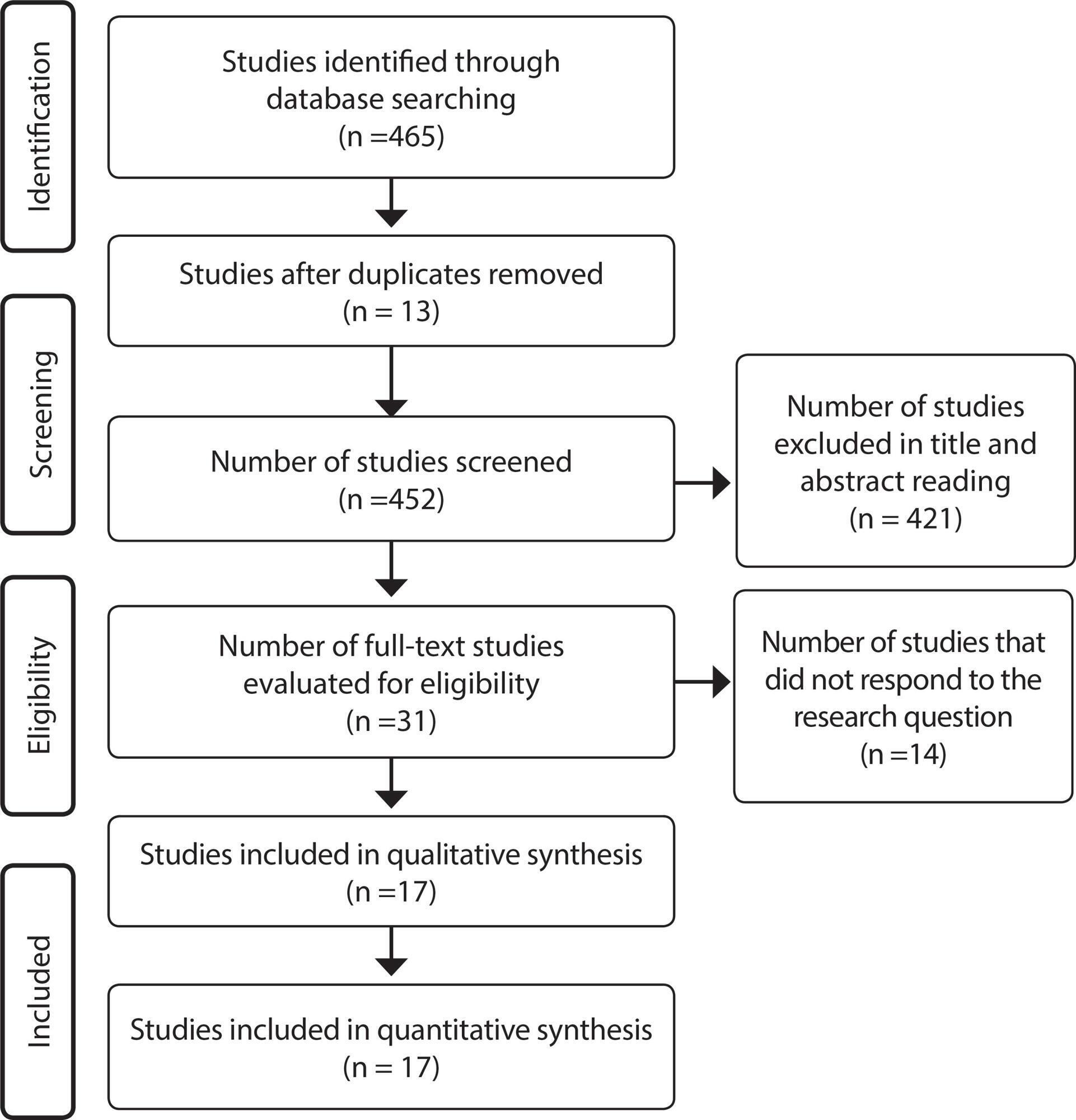
-
ORIGINAL ARTICLE10-21-2019
Workloads and burnout of nursing workers
Revista Brasileira de Enfermagem. 2019;72(6):1435-1441
Abstract
ORIGINAL ARTICLEWorkloads and burnout of nursing workers
Revista Brasileira de Enfermagem. 2019;72(6):1435-1441
DOI 10.1590/0034-7167-2017-0659
Views0See moreABSTRACT
Objective:
to identify workloads in nursing work and its association with nursing worker burnout.
Method:
a cross-sectional study, including 211 nursing workers from a university hospital, between July and August 2016. For the analysis, the descriptive statistics, Chi-Square Test, Fisher’s Exact Test and Mann Whitney U-Test were used.
Results:
the most evidenced loads were biological. A significant association was found between workloads and workers’ occupation, as well as a significant association between workloads and worker burnout. Burnout caused upper limb pain, neck and lumbar pain, lower limb pain, muscle spasm, lower limb edema, mental fatigue, headache, nervousness, and forgetfulness.
Conclusion:
workloads identification is a subsidy for the promotion of interventions that minimize the burnout generated to the health of the nursing worker.
-
REVIEW12-05-2019
Vulnerability of the elderly: a conceptual analysis
Revista Brasileira de Enfermagem. 2019;72:337-344
Abstract
REVIEWVulnerability of the elderly: a conceptual analysis
Revista Brasileira de Enfermagem. 2019;72:337-344
DOI 10.1590/0034-7167-2018-0728
Views0See moreABSTRACT
Objective:
To analyze the concept of vulnerability of the elderly.
Method:
A concept analysis, according to the method proposed by Walker and Avant, operationalized through integrative review through search in scientific data portals using the
Descriptors:
Health vulnerability, aged, health services for the aged, health of the elderly, vulnerable populations and geriatric health services. To compose the literary corpus, 36 studies were selected.
Results:
Concept antecedents, as well as its attributes, were identified in individual, social and programmatic characteristics, which make up the characteristics of “vulnerability of the elderly”, besides consequences of the phenomenon. These characteristics were analyzed with emphasis on aspects that contribute to the process of vulnerability of the elderly.
Conclusion:
The study demonstrated the multidimensionality of the phenomena studied, highlighting the peculiarities of vulnerability during aging. However, there is a need for further studies on the construct.
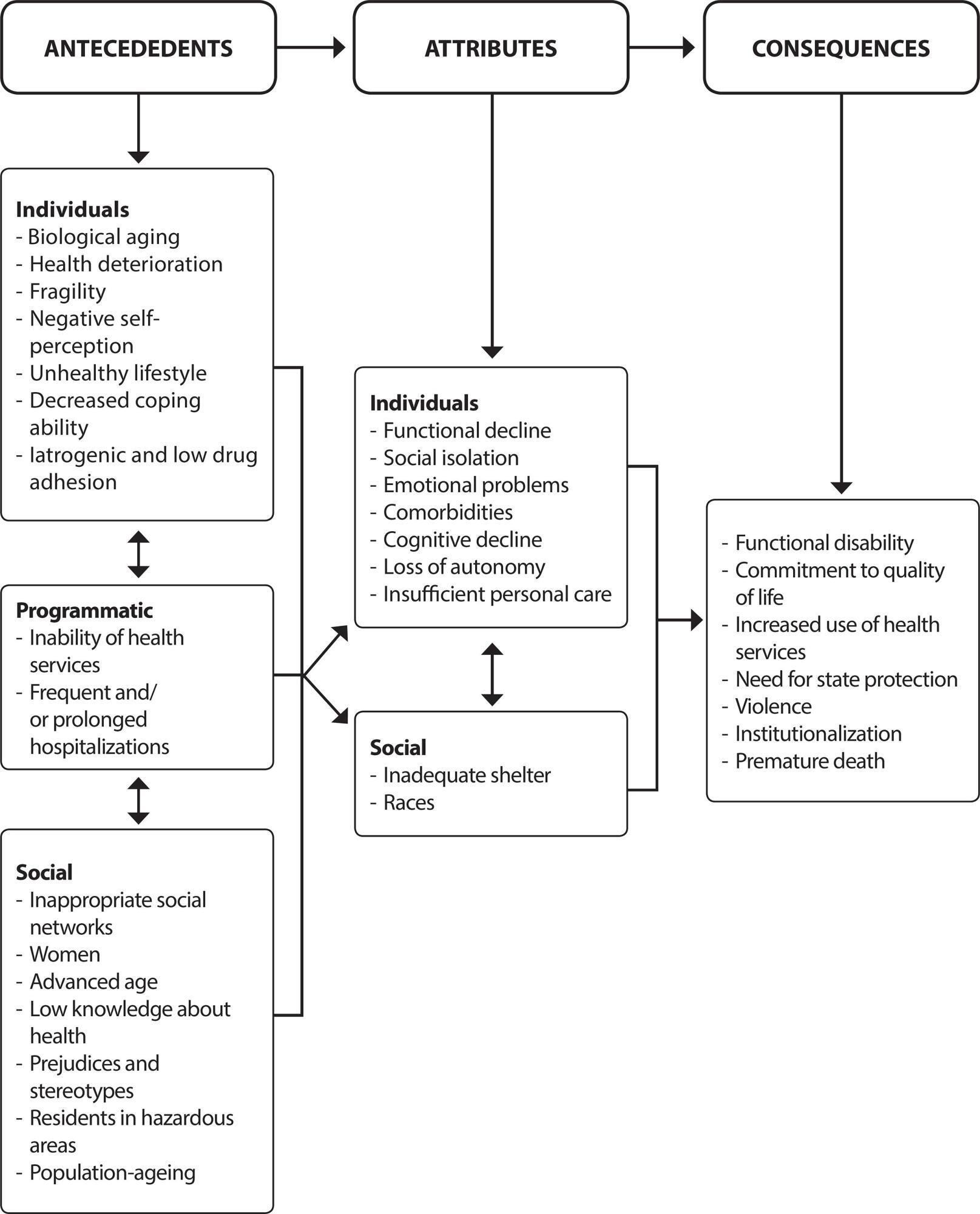
-
ORIGINAL ARTICLE07-13-2020
Incontinence-associated dermatitis in elderly patients: prevalence and risk factors
Revista Brasileira de Enfermagem. 2020;73:e20180475
Abstract
ORIGINAL ARTICLEIncontinence-associated dermatitis in elderly patients: prevalence and risk factors
Revista Brasileira de Enfermagem. 2020;73:e20180475
DOI 10.1590/0034-7167-2018-0475
Views0See moreABSTRACT
Objective:
To determine the prevalence and risk factors for incontinence-associated dermatitis in the elderly.
Method:
Cross-sectional exploratory study carried out in public hospitals. The dermatitis prevalence and associations were obtained by calculating the ratio. The effect dimension was estimated by the odds ratio with a 95% confidence interval and statistical significance p <0.05.
Results:
138 elderly people were included, with an average age of 77.2 years old (± 9.3); 69 (50%) had combined fecal and urinary incontinence. The dermatitis prevalence was 36.2% (50); 28% (14) had pressure injuries; 14% (7), candidiasis. Risk factors were: longer hospital stay (Odds Ratio = 5.8 [2.6-12.9]), obesity (Odds Ratio = 3.6 [1.2-10.4]), high level of dependence (Odds Ratio = 2.4 [1,1-5,0]) and high risk for pressure injury (Odds Ratio = 6.1 [1,4-26,9]).
Conclusion:
The study found a high prevalence of dermatitis associated with incontinence. The early recognition of risk factors favors effective preventive actions.
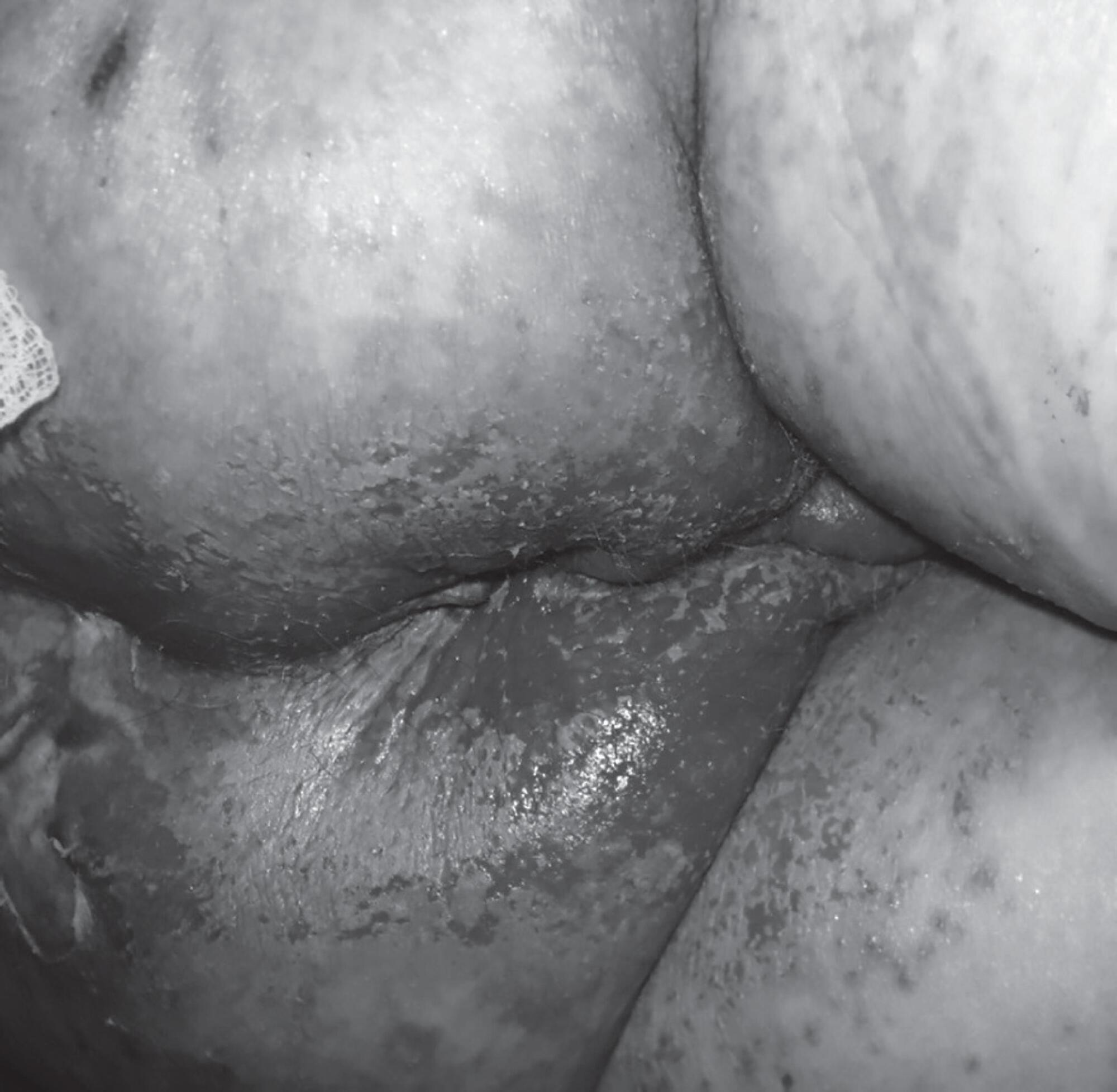
-
08-19-2019
Clinical simulation in nursing education in intensive therapy: an integrative review
Revista Brasileira de Enfermagem. 2019;72(4):1061-1070
Abstract
Clinical simulation in nursing education in intensive therapy: an integrative review
Revista Brasileira de Enfermagem. 2019;72(4):1061-1070
DOI 10.1590/0034-7167-2018-0217
Views0See moreABSTRACT
Objective:
to analyze the publications on clinical simulation practices for education in Nursing in Intensive Care.
Method:
an integrative review carried out through LILACS, PubMed, Cochrane Library, CINAHL and SciELO databases, of articles published from 2008 to 2017.
Results:
29 articles were selected, of which 76% discuss the use of simulation in continuing education of nursing professionals, while the others describe their use for student education. There is a higher prevalence of studies with a level of evidence 6 (17), with 28 international publications. There was an increase in scientific production, with 16 articles published in the last three years.
Conclusion:
variables after simulation use, such as confidence, communication skills, efficiency in the identification of clinical worsening of patients, development of technical skills, teamwork and clinical decision-making, presented a significant improvement, demonstrating that this tool is effective in qualifying care for critical patients.
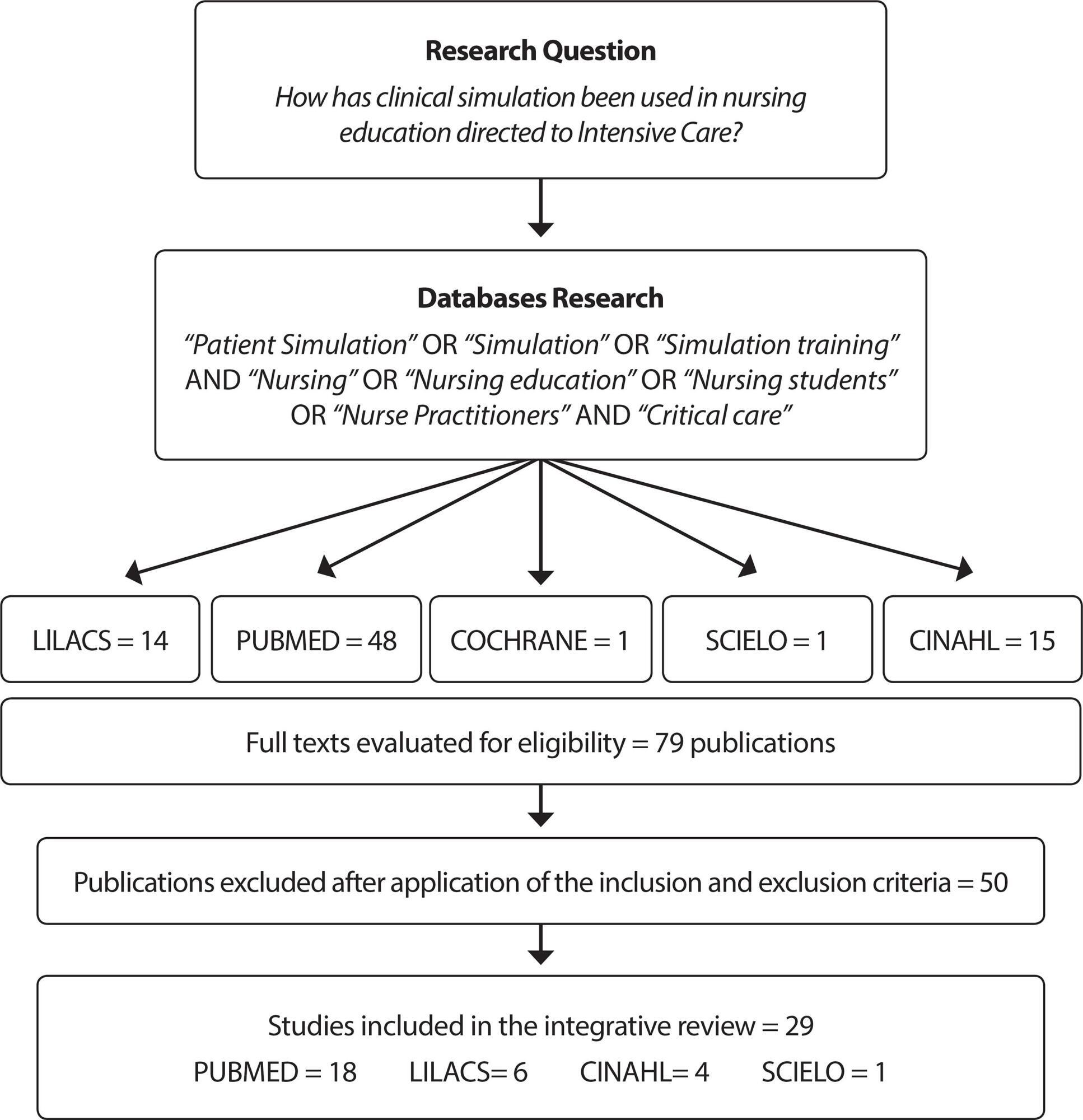
-
01-20-2021
Burnout Syndrome and Associated Factors in Intensive Care Unit Nurses
Revista Brasileira de Enfermagem. 2021;74:e20190535
Abstract
Burnout Syndrome and Associated Factors in Intensive Care Unit Nurses
Revista Brasileira de Enfermagem. 2021;74:e20190535
DOI 10.1590/0034-7167-2019-0535
Views0See moreABSTRACT
Objective:
to estimate prevalence and factors associated with Burnout Syndrome in intensive care nurses in a city in the state of Bahia.
Methods:
a cross-sectional, population-based study carried out with 65 intensive care nurses through a self-administered questionnaire, from July to November 2016, containing sociodemographic data, lifestyle, work characteristics. To define burnout syndrome, the Maslach Burnout Inventory was used.
Results:
Burnout Syndrome prevalence was 53.6%, an association was observed with age, tobacco consumption, alcohol use, weekly night shift hours, employment relationship, having an intensive care specialist title, number of patients on duty, monthly income and considering active or high-strain job.
Conclusion:
the results of this study can contribute to expanding the discussion on stressful working conditions in Intensive Care Units.
-
ORIGINAL ARTICLE12-05-2019
Elderly caregivers of the elderly: frailty, loneliness and depressive symptoms
Revista Brasileira de Enfermagem. 2019;72:88-96
Abstract
ORIGINAL ARTICLEElderly caregivers of the elderly: frailty, loneliness and depressive symptoms
Revista Brasileira de Enfermagem. 2019;72:88-96
DOI 10.1590/0034-7167-2018-0137
Views0See moreABSTRACT
Objective:
to investigate the association between frailty, loneliness and depressive symptoms of elderly caregivers.
Method:
a cross – sectional study carried out with 341 elderly caregivers enrolled in Family Health Units of a city in the countryside of São Paulo State. The interviews were domiciliary and included questionnaire for characterization of the caregiver, Fried’s frailty phenotype, family APGAR (family functionality), Geriatric Depression Scale (depressive symptoms) and item 3 of the Herth Hope Scale (loneliness). Logistic regression was used to analyze the association between depressive symptoms and solitude (independent variables), and frailty and pre-frailty (dependent variables).
Results:
there was an association between frailty, loneliness and depressive symptoms. Elderly caregivers had increased odds of 158% presenting pre-frailty, and 360% of frailty. Elderly caregivers with depressive symptoms had an increased chance of 242% of presenting fragility.
Conclusion:
elderly and lonely caregivers with depressive symptoms are more likely to be frail and pre-frail.
-
ORIGINAL ARTICLE06-08-2020
Usability of a mobile application on diabetic foot self-care
Revista Brasileira de Enfermagem. 2020;73(4):e20180862
Abstract
ORIGINAL ARTICLEUsability of a mobile application on diabetic foot self-care
Revista Brasileira de Enfermagem. 2020;73(4):e20180862
DOI 10.1590/0034-7167-2018-0862
Views0See moreABSTRACT
Objectives:
to assess the usability of an app prototype for diabetic foot self-care by an end user.
Methods:
a descriptive study that uses heuristic assessment of a hybrid app usability. Fifteen users of an outpatient diabetes care service in a capital of Northeastern Brazil participated in the study during April 2018. The usability measurement tool called Smartphone Usability questionnaiRE was applied.
Results:
the lowest score was 77 and the highest was 112, with an average usability of 96.1 points. Usability was framed in the last two levels, 70 and 8o. Users now strongly agree (level 70) and fully (level 80) with the assessed items, which represents good usability of the apps prototype.
Conclusions:
the final product developed focuses on user needs and requirements, which can ensure usability based on effectiveness, efficiency and satisfaction triad.
Search
Search in:
Nuvem de Tags
Adolescente (85) Atenção Primária à Saúde (239) COVID-19 (91) Criança (91) Cuidados de Enfermagem (269) Educação em Enfermagem (151) Educação em Saúde (139) Enfermagem (930) Enfermagem Pediátrica (86) Estudantes de Enfermagem (77) Estudos de Validação (131) Família (87) Idoso (208) Promoção da Saúde (99) Qualidade de Vida (104) Saúde do Trabalhador (86) Saúde Mental (145) Saúde Pública (82) Segurança do Paciente (150) Tecnologia Educacional (100)



